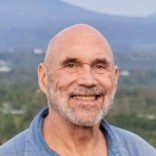The Anesthesiologist
Bob Ostertag
It’s hard to know just what kind of condition you are in lying on a gurney in the back of an ambulance, but I noted that we had set out on our journey to the ER with only the light flashing, and then the siren went on. I figured things weren’t looking so good when the ambulance driver suddenly hit the gas and we accelerated to a different speed entirely.
I had been at home convalescing from surgery when an artery in my throat had burst. By the time the ambulance arrived I had blood coming out of both ends, and my bedroom and bathroom looked like a horror movie set.
As the gurney was lifted from the ambulance someone handed me a bowl to vomit blood into and an orderly started running me through the ER door and down a hallway. As we careened around a corner, the bowl fell from my hands, sending HIV+ blood everywhere. “That was awesome,” the orderly whispered, but he didn’t slow down.
Machines were going off like cyborg blackbirds signaling the approach of a predator. People shouting “No Pulse! No Pulse!” People rushing to and fro with one device or another.
I discovered an amazing thing that happens when a body swallows that much blood: the blood goes down as liquid but congeals in the stomach, so the body must produce an otherworldly convulsion to expel it. The back arches, the legs kick, the vocal cords emit a sound with no human reference, and a blood jellyfish comes flying out of the mouth and sails across the room. In a previous century, someone would have put a stake through my heart.
I learned this because I was watching it all from the ceiling. I observed my body doing these amazing things, but I did not feel them. Man, that must have hurt, but I felt no pain. I observed this team of highly trained professionals, the special forces of medicine, executing a high precision series of maneuvers, correctly and in the least possible amount of time, but I wasn’t on that team. They were going to do what needed to be done in time for me to continue living or they weren’t. I had no say in that matter.
I didn’t see a white light at the end of a tunnel, yet it was very peaceful up there on the ceiling. If this was going to be my last experience of life, I wanted to notice everything. The energy crackling through the room as everyone applied brain cell and muscle to the task at hand. The tension in the curt commands and reports shouted back and forth, complete economy of syllables. My body doing all these things I had no idea it was capable of, and all without me.
I didn’t see a movie of my life play fast forward in my head, but I had time to contemplate my life. I thought lovingly of my child who was becoming a young adult and was ready to find her way in the world without me. It occurred to me that my life had been a good one and had been enough.
From their actions and words, I learned that I would have to undergo surgery to repair the wound, and they could not put me under general anesthesia unless they could get some blood into me, which was not so easy precisely because I had run out of it. I had lost so much blood that my veins had collapsed and they couldn’t get a needle into one to pump blood back in. So that was the race: were they going to get enough blood into a vein to get me into surgery before I expired?
Eventually they must have found a vein because I was suddenly whisked from the ER into an operating room, which brought me down off the ceiling and back home in my body, with the strange taste of liquid blood in my mouth and dried blood caked on my face. A new team of differently trained professionals were rushing into place a different collection of high-tech instruments. I was aware that someone had sat down next to me and was intently focused on the display of the nearby medical device: the anesthesiologist. For the first time since I entered the ambulance, I was aware of someone not as a medical action figure but as a human being. A man. With sandy hair, a kind face, and a calm that was immensely soothing to me at that moment. I smiled. He smiled back.
“Are you gay?” I was startled to discover I had a voice, and a sense of humor.
He gave a start, and his smile widened.
“Why, yes, I am.”
“Can I have your phone number?”
We both burst out laughing. Everyone in the operating room looked at us in surprise. What could these two possibly be laughing about.
“I’ll tell you what,” he answered, holding that mask just above my face. “If you live through this, yes, you can have my phone number.”
And everything went black.


